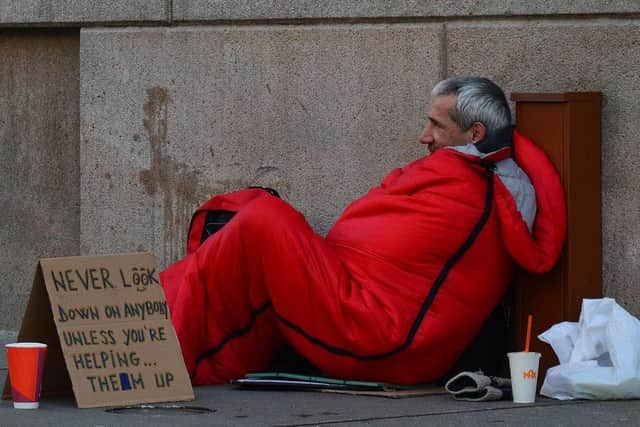Begging crimes on the rise in West Yorkshire, new figures reveal
and live on Freeview channel 276
The number of prosecutions in the area in 2018/19 was 181 compared to just 51 the previous year, according to figures provided by the Crown Prosecution Service in response to Freedom of Information requests. The previous highest figure over the last 10 years was 68 in 2011/12.
Homeless Link, which represents more than 700 homeless and supported housing organisations, said criminalising people under a law enacted in 1824 is “hugely damaging” and hinders efforts to provide support for rough sleepers.
Advertisement
Hide AdAdvertisement
Hide AdThe Vagrancy Act was initially introduced in response to a large number destitute veterans who had returned home following the Napoleonic Wars, which ended in 1815, and Homeless Link is part of a campaign led by another homeless charity, Crisis, calling for its repeal.


It is unclear why there was such a significant increase in prosecutions when usage has generally been falling across the country in recent years as authorities have increasingly used targeted anti-social behaviour measures, such as Public Spaces Protection Orders, instead.
West Yorkshire Police said it used the Vagrancy Act “where necessary and proportionate” and insisted the main aim was to get support for people who were genuinely homeless.
Mark Burns-Williamson, West Yorkshire’s Police and Crime Commissioner (PCC), said his office had provided financial resources for homeless support services and enforcement action for begging “was usually deployed as a last option.”
Advertisement
Hide AdAdvertisement
Hide AdA Homeless Link spokeswoman said: “It is disappointing to see such a steep increase in prosecutions for begging in West Yorkshire in 2018/19. The Vagrancy Act 1824 is outdated and, worse than that, it is hugely damaging.
“Threat of punishment drives people further away from the services and support that is there to help, and criminalising people for sleeping rough has an adverse effect on the efforts being made by many to end rough sleeping.
“The Government is currently reviewing the Vagrancy Act, but Homeless Link stand alongside our members – homelessness organisations up and down the country - in fully supporting the campaign to Scrap the Vagrancy Act, led by charity Crisis.”
Nationally, use of the Vagrancy Act over the last 10 years for begging peaked in 2014/15 when the number of prosecutions reached 3,071. The number has generally fallen away since then with the 2018/19 total standing at 1,766.
Advertisement
Hide AdAdvertisement
Hide AdThe other Yorkshire police force areas show relatively low numbers of cases reaching magistrates’ courts. South Yorkshire had 13 in 2018/19 and 29 the previous year, Humberside had 22 and 23 respectively and North Yorkshire five in both years.
Superintendent Richard Close of West Yorkshire Police, said: “People who beg or sleep rough on the streets often have complex and challenging needs that only specialist support from a range of agencies can begin to address.
“Police work is only one part of this support package and we work closely with our partner agencies and support organisations to make sure that collectively we are addressing the issues around rough sleeping, vagrancy, begging and anti-social behaviour. We fully appreciate it is a highly emotive subject.
“As police our main concern is to help those at risk and we do a lot of work to support genuinely homeless people who by virtue are vulnerable and seek to get them the help they need from partners.
Advertisement
Hide AdAdvertisement
Hide Ad“The main thing for us is to make sure people who are vulnerable get the help they need. We are finding increasingly that some vulnerable people do have accommodation and receive benefits but have other issues that see them on the streets.
“We do have a range of legislative powers available to us and where individuals repeatedly refuse to engage with us and / or get the help they need we have no option but to take enforcement action. This has included arrests under the Vagrancy Act where necessary and proportionate but we also look to use other options including dispersal orders and Public Spaces Protection Order Zones
“The police and our partner agencies are committed to working together to protect vulnerable people and will continue to use all available measures to help people on the streets to turn their lives around.”
Mark Burns-Williamson, West Yorkshire’s Police and Crime Commissioner (PCC), said: “Enforcement action is usually deployed as the last option as we need to ensure we have and are supporting people into getting appropriate accommodation and the support they need. Indeed, I have supported a number of organisations in West Yorkshire through my Safer Communities Fund in helping to provide such support.
Advertisement
Hide AdAdvertisement
Hide Ad“However, sadly the impact of persistent aggressive begging and the anti-social behaviour associated with it, sometimes cannot be ignored when complaints are made and proportionate action is then assessed and taken.”